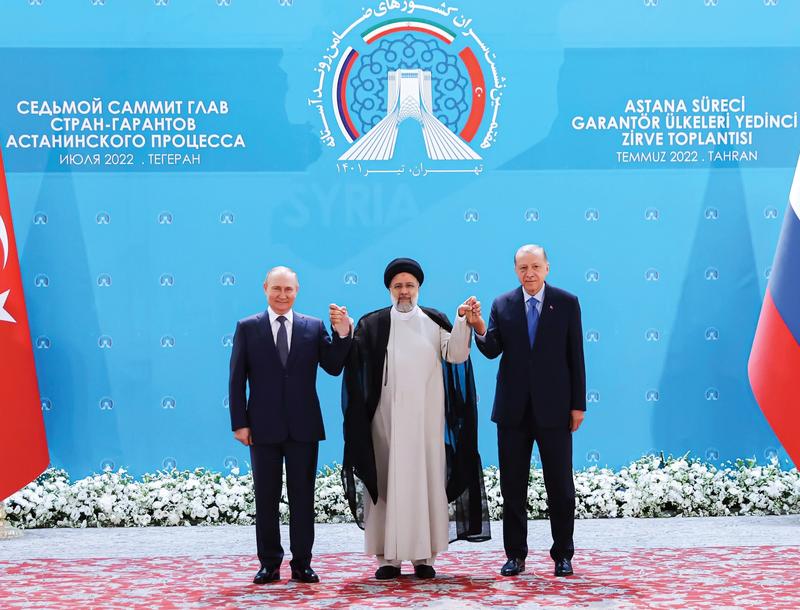 Russian President Vladimir Putin (left), Iranian President Ebrahim Raisi (center) and Turkish President Recep Tayyip Erdogan meet during a trilateral summit in Teheran on July 19. (IRANIAN PRESIDENCY / XINHUA)
Russian President Vladimir Putin (left), Iranian President Ebrahim Raisi (center) and Turkish President Recep Tayyip Erdogan meet during a trilateral summit in Teheran on July 19. (IRANIAN PRESIDENCY / XINHUA)
The coming together of Iranian, Russian and Turkish leaders for a summit focused on peace-building process in Syria shows that international affairs can be managed in a democratic and nonmilitaristic way, according to analysts and observers.
They said the trilateral meeting also reaffirmed that the Syrian crisis can be resolved without interference from the United States which “has caused detriment to the region”.
Iranian President Ebrahim Raisi, Russian President Vladimir Putin of Russia and Turkish President Recep Tayyip Erdogan attended the 7th Summit of the Astana peace talks on Syria on July 19 in the Iranian capital Teheran.
The three countries are guarantors of the Astana Process, which was initiated in 2017 to build peace in Syria.
In a joint news conference on July 19, the three leaders praised the dialogue and emphasized that all parts of Syria “should be established under the rule of a legitimate government”.
They described the presence of the Americans in the east of the Euphrates, under any pretext, as “not legitimate” and said that they “should leave the area”.
US troops are still present in Syria and have been accused several times of stealing Syrian oil and grain.
Raisi said the presidents stated that attacking the people and armed forces in Syria “is a violation of the sovereignty of this country and against international laws”, stressing such attacks be stopped.
Putin insisted that the future of Syria “must be drawn by the Syrians without dictating from outsiders” while Erdogan said they “do not see any difference between all terrorist organizations” and do not accept that “one is used as a tool to fight another”.
Jawaid Iqbal, a political science professor and chairman of the Department of West Asian and North African Studies at Aligarh Muslim University in India, said the summit is significant as it emphasized issues related to occupation, territorial integrity, terrorism, Western sanctions and national reconstruction.
Iqbal said unlike the unilateral approach of the Euro-Atlantic world, the Astana Process shows a multilateral method of resolving regional problems.
“The Astana Process has proven to be accommodative, evident from the way in which Moscow and Teheran have been able to limit Ankara’s plan to launch a military incursion into Syria’s northern border region,” said Iqbal.
Arhama Siddiqa, a Middle East expert and research fellow at the Institute of Strategic Studies in Islamabad, said the statements made by each of the countries reflected their individual positions on Syria.
“For instance, President Raisi stated that both the American and Israeli presence (were) unacceptable. Likewise, Russia also condemned the West for the devastation in Syria,” said Siddiqa.
“Peace in Syria should come about through a political process premised on inclusivity and that there is no military solution.”
Saddiqa said this was in stark contrast to US President Joe Biden’s intention on his trip to the Middle East last week — which was “to reassure the region that the US had not deprioritized it”.
The trilateral meeting was also an important signal that the world has not forgotten Syria, she added.
Biden’s Middle East visit — his first since assuming office last year — was for the Jeddah Security and Development summit hosted by Saudi Arabia on July 16.
Biden said there that the US would not “walk away and leave a vacuum” in the region for Russia, China, or Iran to fill and would build on “American leadership”.
He also signed the Jerusalem Declaration with Israel, affirming their commitment to preventing the nuclear armament of Iran.
After the GCC summit attended by Biden, Saudi Arabia’s Foreign Minister Prince Faisal bin Farhan said there was no such thing as an “Arabic NATO” and that talks between his country and Iran “have been positive”.
He also confirmed that “Saudi Arabia’s hand is extended to Iran to achieve normal relations”.
Henelito A. Sevilla Jr, a Middle East expert and dean at the Asian Center at the University of the Philippines, said the Astana troika meeting was a way of narrowing conflicting interests and working genuinely for the peace and development of the Syrian people.
“It is also one way of strategizing how these three countries can forge trilateral alliances against their perceived common enemies and threats,” Sevilla said.


